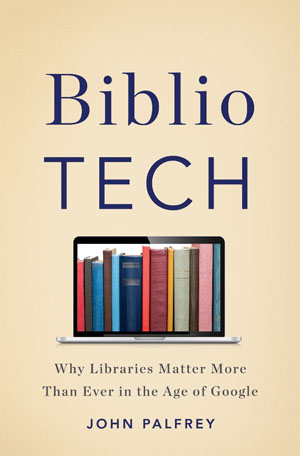Upcoming Events: Expanding the Definition of Membership in Public Media (6/2); BiblioTech: Why Libraries Matter More Than Ever In An Age of Google (6/22)
Upcoming Events / Digital Media May 27, 2015 |
berkman luncheon series Expanding the Definition of Membership in Public MediaTuesday, June 2, 12:00pm ET, Milstein East C, Wasserstein Hall, Harvard Law School. This event will be webcast live. 
What does it mean to be a member of a public radio station in the United States? What could it mean? How could expanding the definition of membership instill a sense of ownership and identity among listeners, allowing them to feel more connected and invested in the work we do? I am creating the framework for a new model of membership within public media that would offer membership to people who may not be able to donate financially, but would like to donate a skill or their time to their local stations. I suspect this will inculcate a sense of identity and ownership amongst listeners, allowing them to feel more invested in public radio’s content, work, and mission, while also transforming public media stations into public community spaces that continue to fulfill the original mission. Melody Kramer is currently serving a two-year term appointment with 18F and frequently works on side projects within the audio, public media, podcasting, and civic technology space. She is also a 2014-2015 Visiting Nieman Fellow at Harvard University and a weekly columnist for Poynter, where she covers people who live outside of SF/DC/NY who are doing amazing things in the news business. RSVP Required. more information on our website> special event BiblioTech: Why Libraries Matter More Than Ever In An Age of GoogleMonday, June 22, 6:00pm ET, Harvard Law School. Reception to follow. Co-sponsored by the Harvard Law School Library. 
John Palfrey will discuss his new book, BiblioTech: Why Libraries Matter More Than Ever In An Age of Google. He argues that anyone seeking to participate in the 21st century needs to understand how to find and use the vast stores of information available online. Libraries play a crucial role in making these skills and information available — and yet are at risk. In order to survive our rapidly modernizing world and dwindling government funding, libraries must make the transition to a digital future as soon as possible—by digitizing print material and ensuring that born-digital material is publicly available online, while continuing to play the vital role as public spaces in our democracy that they have for hundreds of years. John Palfrey is the Head of School at Phillips Academy, Andover. He serves as Chair of the Board of Trustees of the Knight Foundation and President of the Board of Directors of the Digital Public Library of America. He also serves as a director of the Data + Society Research Institute. John’s research and teaching focus on new media and learning. He has written extensively on Internet law, intellectual property, and the potential of new technologies to strengthen democracies locally and around the world. He is the author or co-author of several books, including BiblioTech: Why Libraries Matter More Than Ever in the Age of Google (Basic Books, 2015); Interop: The Promise and Perils of Highly Interconnected Systems (Basic Books, 2012) (with Urs Gasser); Intellectual Property Strategy (MIT Press, 2012); Born Digital: Understanding the First Generation of Digital Natives (Basic Books, 2008) (with Urs Gasser); and Access Denied: The Practice and Politics of Global Internet Filtering (MIT Press, 2008). John served previously as the Henry N. Ess III Professor of Law and Vice Dean for Library and Information Resources at Harvard Law School. He is a director of the Berkman Center for Internet & Society, where he was executive director from 2002-2008. RSVP Required. more information on our website> video/audio The Arab Networked Public Sphere: Social Mobilization Post-Revolutions
Researchers working with Harvard’s Berkman Center for Internet & Society, the American University in Cairo’s Access to Knowledge for Development Center, Innova Tunisia and the Arab Policy Institute discuss current research conducted on the evolution of the networked public sphere and social mobilization post-revolutions in Egypt and Tunisia. The networked public sphere has emerged as an influential medium for sharing news, disseminating information, and mediating collective action. Many have pointed to the impact of digital media on politics and public affairs, particularly in promoting and coordinating popular protests. Digitally mediated collective action continues to play a prominent role in the political landscape in Egypt and Tunisia. Nevertheless, rigorous assessments of the networked public sphere’s impact, modalities, and relationship to collective action offline are still rare. In this session, we will present and discuss research that focuses on tracking and analyzing the socio-political topics in online content and their interplay with offline networks based on fieldwork research in Egypt and Tunisia. video/audio on our website> |
Other Events of NoteLocal, national, international, and online events that may be of interest to the Berkman community:
|
You are receiving this email because you subscribed to the Berkman Center's Weekly Events Newsletter. Sign up to receive this newsletter if this email was forwarded to you. To manage your subscription preferences, please click here. Connect & get involved: Jobs, internships, and more See our events calendar if you're curious about future luncheons, discussions, lectures, and conferences not listed in this email. Our events are free and open to the public, unless otherwise noted.
|
The Berkman Center for Internet & Society at Harvard University was founded to explore cyberspace, share in its study, and help pioneer its development. For more information, visit http://cyber.harvard.edu.  |